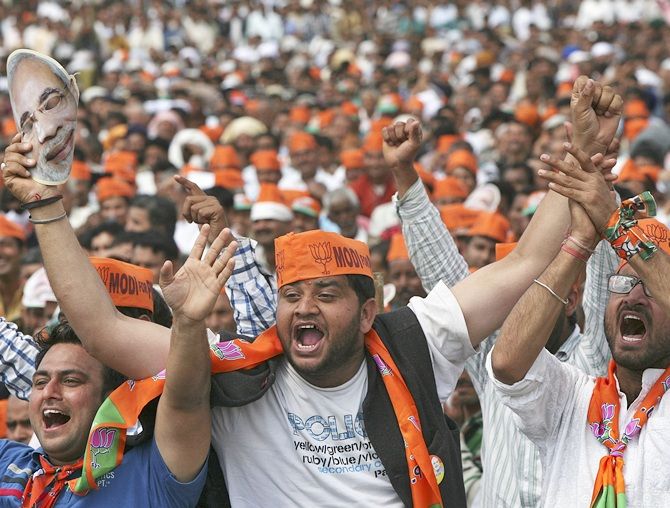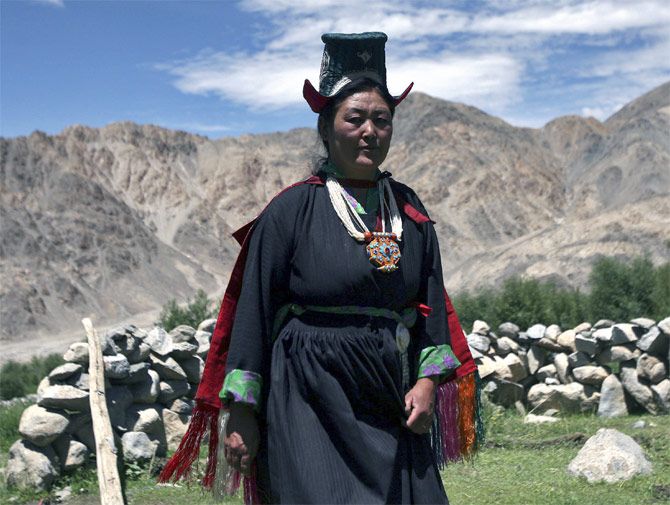'J&K continues to have the highest concentration of military personnel anywhere in the world. The alienation of the Kashmiri has increased and been more profoundly articulated in the last ten years than ever before.'
'This new coalition has introduced yet another reason for wariness in the body politic of J&K,' says academic Dr Siddiq Wahid.

An academic by temperament, a historian by training and an activist by compulsion, Dr Siddiq Wahid has been involved in the cause of the peaceful resolution of the Jammu and Kashmir and Tibet political conundrums.
Dr Wahid received his PhD and Masters from Harvard University and is currently a Senior Fellow at the Centre of Policy Research in Delhi.
As two parties from either ends of the political divide came together to form a new government in a history-making moment in J&K, Dr Wahid feels it remains to be seen if the PDP-BJP nuptials will satisfy the peoples of the three distinctive parts of the state.
A native of Ladakh, he tells Archana Masih/Rediff.com via e-mail why he is wary about the PDP-BJP coalition; the increased alienation of Kashmiris and how the most pressing issue is the resolution of the J&K dispute and repair of the social fragmentation that has been forced on the state.
The BJP has made its maiden entry into government in J&K. BJP President Amit Shah has said that glory will be restored in the jewel in the crown. What do you think this new, unchartered and fresh relationship will bring to the sensitive state?
It is too early to say. We'll have to wait until we see the fine print of the so-called Common Minimum Programme or, as it is officially being termed, an 'Agenda for the Alliance.'
But that being said -- this new coalition has introduced yet another reason for wariness in the body politic of the state of J&K.
In principle, the rub until now has been largely political. But because the declared long term agenda of the BJP and its family (Parivar) is to formally give India an exclusively Hindu identity, cultural belligerence will be a key concern of this Muslim-majority state.
In this context, Amit Shah's 'jewel in the crown' comment has the sound of triumphant Hindu nationalist pride in having 'restored' its presence in a Muslim majority state.
The PDP-BJP are no doubt strange bedfellows, do you think these ideological foes can bury the demons of the past and build a lasting political relationship?
Ideologies usurp ideas in the pursuit of power. Politics, good politics, seeks to regulate the excesses of power for a greater good.
When politics becomes subservient to ideology, politicians pursue power for its own sake.
In such situations, ideological foes will bury their 'demons' very quickly in the interests of acquiring and retaining power. History is replete with examples of such compromise.
How long this bedding lasts will depend on how long such partnerships are able to fool how many of the people and for how long.
The PDP dominates Kashmir, the BJP Jammu, the Congress, Ladakh -- how do you foresee the aspirations of these three distinct regions, particularly Ladakh, being fulfilled under this new dispensation?
There are various kinds of aspirations of collectives -- of universal principles, of the need to preserve the distinctiveness of collectives and of the stomach.
Political parties have an obligation to pay heed to all of them and in that order of priority.
The BJP-PDP nuptial has chosen to address the stomach and consigned the other two aspirations to the 'back burner.' It remains to be seen if this will satisfy the peoples of the three distinctive parts of the state.
How is this alliance being viewed by the people of the state considering that Mufti Mohammed Sayeed himself and PDP have been vociferous critics of Narendra Modi in the past?
There have already been loud protests in Jammu against the alliance.
In Kashmir the protests have been even louder from the very start, although it has not found much coverage in the media.
But then are we to believe that what the people think matters? Today's politician is habituated to ignoring the people. Why should the coalition of BJP-PDP politicians be any different?
What according to you are the most pressing issues that the new government needs to address?
The pressing issues are: The resolution of the dispute over the state of J&K; the repair of the social fragmentation that has been forced on the state of J&K -- in its entirety -- in the last 67 years; the hollowing out of public institutions in the state of J&K and the decimation of the economy of the state; again, in that order of priority, without prejudice to the possibility of simultaneity in addressing them.
The government has a robust representation from Jammu and Kashmir. Are you concerned that the aspirations and problems of Ladakh may suffer from neglect from the legislators?
Ladakh has suffered the least in the last 25 years in terms of its material aspirations. Witness the enviable development it has achieved in infrastructure, income distribution and salience in identity in the last quarter century.
However, in matters of political principle it has lost much. There is a deep communal divide between Buddhists and Muslims, albeit about which many Ladakhis are in denial.
And its political discourse has largely consisted of merely (and loudly) proclaiming that it is 'more loyal than the Kashmiri' to New Delhi, an argument that considerably lowers the level of political discourse.
Furthermore, whatever neglect from the state's legislators it genuinely suffered from for the four decades immediately after Indian Independence has been largely rectified by the institution of the Autonomous Hill Development Council regimes in both Leh and Kargil.

As a Ladakhi, what are your biggest concerns about Ladakh?
Let me preface my response by saying that my concern is not so much as a Ladakhi, an identity I cherish, but as a citizen of the state who combines -- or assimilates -- his ethnic, linguistic, cultural and intellectual identities into a single whole.
My biggest concern is that Ladakh has fallen into the trap of colluding with successive governments in Delhi to isolate Kashmir and Kashmiris, with whom Ladakh has had a symbiotic relationship in people and politics, commerce and culture and language and the arts for over a thousand years.
Isolating Kashmir and the Kashmiri may have allowed Ladakh to gain materially, but it has ravaged the principles of the idea of peaceful coexistence and the praxis of cooperation with its neighbours.
You have said in the past that J&K and Ladakh have been alienated by the rest of India. As a Ladakhi, what are some of the instances that have made you feel that way?
If you mean personally, I really don't think about it. Sure, there are memories of examples of religious bigotry or racist slurs. One deals with them individually and grows.
It is much more damaging when prejudice and bigotry -- which are fuelled by ignorance -- are applied to entire collectives.
When entities are ignorant about each others' history and geography, they become isolated.
When political relationship is based solely on concern for control, it alienates.
When there is condescension, real or intended, there is disaffection.
When a relationship is tainted by distrust and abetted by betrayal, there is hostility.
When a relationship is defined either by the use of demeaning patronage or brute force, there is separation. All these apply in the story of J&K.
What is the understanding that the rest of India lacks towards J&K and Ladakh? More importantly, why does the rest of India lack this understanding about their countrymen and women from this border state, even 67 years after Independence?
You provide the answer in your own question. The lack of understanding, not just by Delhi but by Pakistan and, to some extent, by China, is a result of the fact that Kashmir, Ladakh, Gilgit and Baltistan made the erstwhile state of J&K (before October 1947) a border state with contiguity to India, Pakistan, Afghanistan, China-Tibet and, but for the slim corridor in the Wakhan, to Kyrgyzstan in Central Asia proper.
With modifications in territorial possession, the same holds true today. Whereas from a 'security studies' point of view this causes these territories to acquire strategic significance, from a domestic policy perspective the border peoples, by virtue of their location, are suspect and so 'controlled' rather than 'administered.'
The difference in the meaning of these two last words facilitates the lack of understanding.
As a social scientist, how can this understanding and sensitivity among the rest of the country be brought about?
A very important question. Understanding and sensitivity of the 'periphery' -- and the state is geographically peripheral -- can be brought about if India does not see the 'borderland' merely as territorial possession but as 'frontier' partnerships populated by peoples of small but precious and distinct ethnicities, languages, cultures and livelihoods.
To give them a sense of well-being -- which is to say concern for their 'security' before that of the territory of a country -- goes a long way in bringing about genuine understanding of places such as Gilgit, Baltistan, Ladakh, Kashmir and all other peoples living along the Himalaya.
The security situation has improved in J&K since what it was 10, 15 years ago, what are some of the biggest differences that you have personally seen and are we any closer towards peace in Kashmir?
This depends, of course, on what you mean by the 'security situation.' The levels of violence may have abated. However, a. the state of J&K continues to have the highest concentration of military personnel anywhere in the world and b. the alienation of the Kashmiri has increased and been more profoundly articulated in the last ten years than ever before.
So no, we are not any 'closer towards peace,' if by that is meant an atmosphere that is in consonance with what the peoples of the state aspire to.
What does the BJP's maiden entry into government in Jammu and Kashmir mean for the state? What kind of change does it herald?
To my mind, the PDP's facilitation of the BJP's entry into the heart of the politics of the state of J&K could take it in one of two diametrically opposite directions.
On the one hand it could bring about a conciliation of some sort within the state (at least on this side of the LoC) so that the fragmentation ceases and divides are repaired. What is needed to achieve this are statesmanship, tolerance and trust.
It remains to be seen whether these qualities exist in any appreciable quantum in the present leadership at the Centre or in the state.
On the other hand, because the PDP's basis for allying itself with the BJP is in recognition and in confirmation of a communal basis for representation, it could exacerbate and metastasize the spread of this already present poison.
In my opinion the PDP, as the largest single party, has lost a historic opportunity to form an alliance with parties which do not have the long term agenda of a Hindu nationalist India and, more importantly, reveal to Jammu that it need not have Hindu legislators to experience equity in political justice, economic equity and civic amenities.
 You have expressed concerns about the BJP's intent of saffronising the Himalayan states? How concerned are you about the saffronisation of J&K?
You have expressed concerns about the BJP's intent of saffronising the Himalayan states? How concerned are you about the saffronisation of J&K?
The short answer to the second question is yes, I am very concerned. However, with regard to the first question, I don't remember having said spoken or written of my concern about the BJP intent to saffronise the breadth of the Himalaya. (I try to stay away from second guessing intent.) Nor do I recall any concrete evidence of this. However, it would not surprise me if I had so said in the context of anecdotal evidence.
Image: Hailing from Ladakh, Dr Siddiq Wahid is a historian of medieval Central Asian political history, with a focus on Buddhism and Islam.
Regardless of that, in the context of J&K: as far as Jammu goes, I think there is enough evidence that it has been significantly saffronised over the last few years, especially since 2008.
In Ladakh, it was attempted during the first NDA regime by way of an initiative called the 'Sindhu Darshan.' But Ladakhis quickly rejected that invention, recognising it, precisely, as a project to saffronise it.
So after a couple of years the Sindhu Darshan scheme was changed and became the 'Sengge Kha Babs Festival,' giving it an ethnic flavour.
As for Kashmir, I think it will be very difficult for the BJP to make any headway in such a project; especially if we are to take their debacle in the Valley during the recent assembly elections as an indicator.
While the PDP has given them a backdoor entry into Kashmir by supporting their candidates for the legislative council in Ladakh and Kashmir, they did not gain a single seat in either of these two constituencies during the assembly elections, with all but one MLA in Kashmir losing their deposits.
So the saffronisation of Kashmir, if there is such intent, is an unrealistic dream.
It is almost a year since the Modi government came to power, what has been your assessment of the last nine months?
It is still trying to find its feet on the economic, social and foreign policy fronts. The BJP's pre-election strategy was to talk development, whip up religious pride in the majority and instill fear in the minorities. This tactic was successful in bringing it to power but whether it can be sustained is a different question.
As far as the agenda for development is concerned it is too soon to tell whether it will deliver, although the Every-Person (aam aadmi) already appears to be showing some scepticism.
On the social front, the government has had to be cautious about alienating its base support while moderating its rhetoric and practice in the interests of credibility and retaining power.
In this vein, Prime Minister Modi did make a statement a week or so ago about not tolerating religious bigotry, but it came too late in the day to be credible or to avoid being chastised by Amnesty International, even as Orissa stands witness to continued Hindu extremism against Christians.
On the foreign relations front, different countries are reacting differently for reasons of corporate wealth protection, but a strong indicator of the generally cautious mood towards the present government was President Barack Obama's guarded lecture on the need to appreciate plurality and diversity, even as he came as the Government of India's chief guest on Republic Day.
So I am somewhere between dubious and sceptical, not to say cynical, in my assessment of the first nine months.
Top two photographs only published for representational purposes.
REDIFF RECOMMENDS










